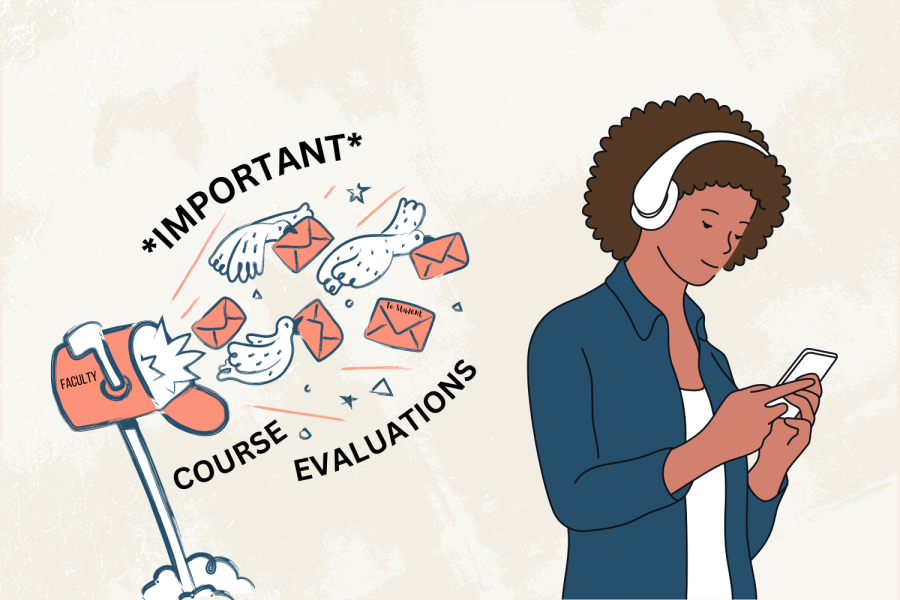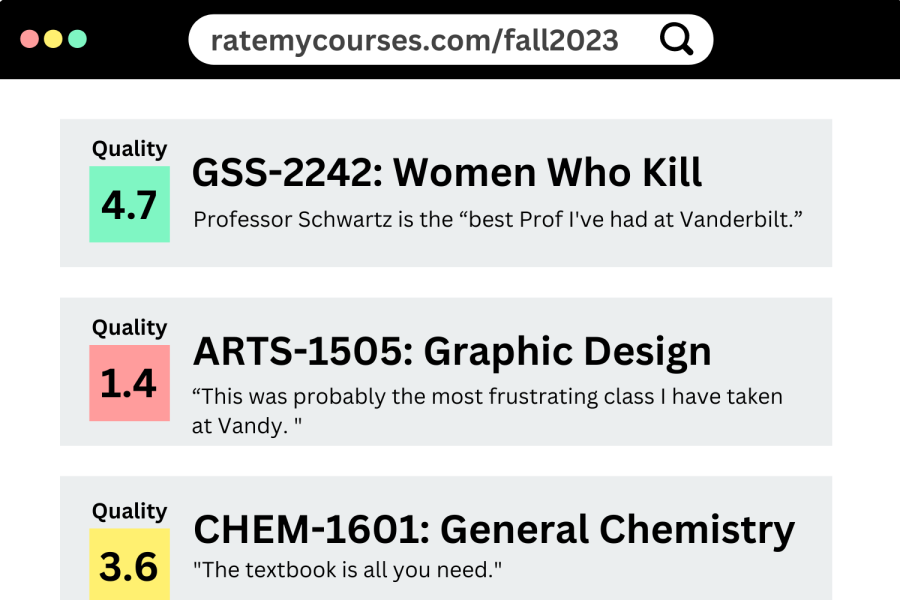At the end of each semester, Vanderbilt students have the opportunity to complete evaluations of each of their courses, but, according to Vice Provost of Faculty Affairs and Professional Education Tracey George, a majority of students at Vanderbilt fail to do so. Despite the evaluations being used for faculty reviews, she said the completion rate is “too low,” and students do not provide enough written comments.
Professors at Vanderbilt believe that most students do not take course evaluations seriously, making it difficult for faculty to utilize them effectively. Students at Vanderbilt waver in their perspective of course evaluations; while some acknowledge their usefulness, others question whether faculty members value them.
According to George, between Fall 2017 and Spring 2022, 46.6% of Vanderbilt undergraduates completed their course evaluations, with spring semesters exhibiting dramatically lower completion rates than the fall. Faculty emphasized the importance of these evaluations and stated that they are helpful in year-to-year changes and utilized during promotion, reappointment and salary changes.
Senior Cassidy Murphy said she knows how course evaluations are used by faculty, but is unaware of how much they are factored into faculty reviews and curriculum design.
“I sometimes do them and sometimes don’t. If I am given time in class to complete them, I will,” Murphy said. “I know that professors do review them as well as their supervisors. However, the lack of an incentive to complete them makes me wonder how much the university cares.”
Students have the opportunity to view course evaluations before choosing classes. Vanderbilt provides students with a portal that allows them to see the average rankings of every professor. However, the majority of them are not available. To see the aggregate scores, the professor must teach at Vanderbilt for three years, and over 51% of their students must complete the course evaluation. Many evaluations state that they are unavailable due to a lack of a sufficient number of responses.
Faculty review process
All professors must undergo an annual review process, which, according to George, occurs at the end of each spring semester. As part of this review, she said faculty members use professors’ course evaluations to evaluate how they performed throughout the semester.
George explained that the entire faculty of their department reviews all of a professor’s course evaluations — along with other materials and methods, such as peer-review classroom observance — in the initial promotion and reappointment review process. She stated that these reviews help faculty members get a glimpse into each others’ classrooms. George added that this process is similar for every professor regardless of the position they are seeking and the school in which the position is housed.
The standard for promotion includes three categories: excellence in research, scholarship or creative expression, excellence in teaching and sufficient service.
“The three standards are independent; a deficiency in one area cannot be offset because the candidate exceeds the required standard in another,” Vanderbilt’s Faculty Manual reads.
Quality of responses
Senior Lecturer in the Department of Physics and Astronomy Savanna Rae Starko said she values the thoughtfulness of students who fill out course evaluations but believes that students do not take them seriously overall. While she says the numerical ratings are helpful, Starko stated that the comments section provides the greatest opportunity for impactful course evaluations by allowing students to provide insight into their experiences, as well as an in-depth outlook on the course.
"I think the prevailing idea is to not take them seriously overall, however, because students believe they don't mean anything or go anywhere,” Starko said.
George commended students who put thought into their responses.
“I really appreciate the ones where it’s not just an adjective. It’s not just a conclusion, but it explains how the student got there,” George said.
George said that, on occasion, some students utilize course evaluations to make rude and unprofessional comments. However, her office was unable to share any comments from an evaluation.
Senior Lecturer of Psychology Elisabeth Sandberg called her experience with unprofessional comments “demoralizing.”
“There are some students who say absolutely horrible things,” Sandberg said. “Basically trolling. It is unbelievably demoralizing to read a collection of spiteful comments. There are better ways to express one’s extreme displeasure with a course.”
Student and faculty perspectives on course evaluations
Sophomore Jacqueline Leung said she appreciates the opportunity to provide feedback on courses via the evaluation process.
“I really like course evaluations because it’s a way for me to express my thoughts on a course, and I know they’re often actually useful as well,” Leung said.
Sandberg said that she uses student feedback from course evaluations to improve her curriculum.
“My own professional perspective on the structure of projects, order of topics and nature of assignments can be very different from students’ experience of the same. I use this information to refine, change, expand and eliminate parts of my curriculum,” Sandberg said.
Starko added that the changes inspired by course evaluation feedback can reach beyond adjustments to the curriculum.
“Student feedback in evaluations has indicated that the students appreciate being treated as people first,” Starko said. “That’s a hallmark of our classes that I love. With that feedback, I’ve really leaned into a reminder to myself to do my best daily — even when it’s hard — and to believe that everyone is trying their best.”
Sophomore Phone Aye echoes the ideas shared by professors. He said he finds course evaluations important because they give students more agency to shape their education.
“I think course evaluations are important in shaping the class structure to better fit the students' needs as well as their education experience,” Aye said. “It also helps students feel a better connection to altering and shaping their education.”





Blah • Apr 10, 2023 at 7:44 am CDT
Maybe Sandberg wouldn’t have such a problem with negative comments if she wasn’t such a rude and ineffective professor